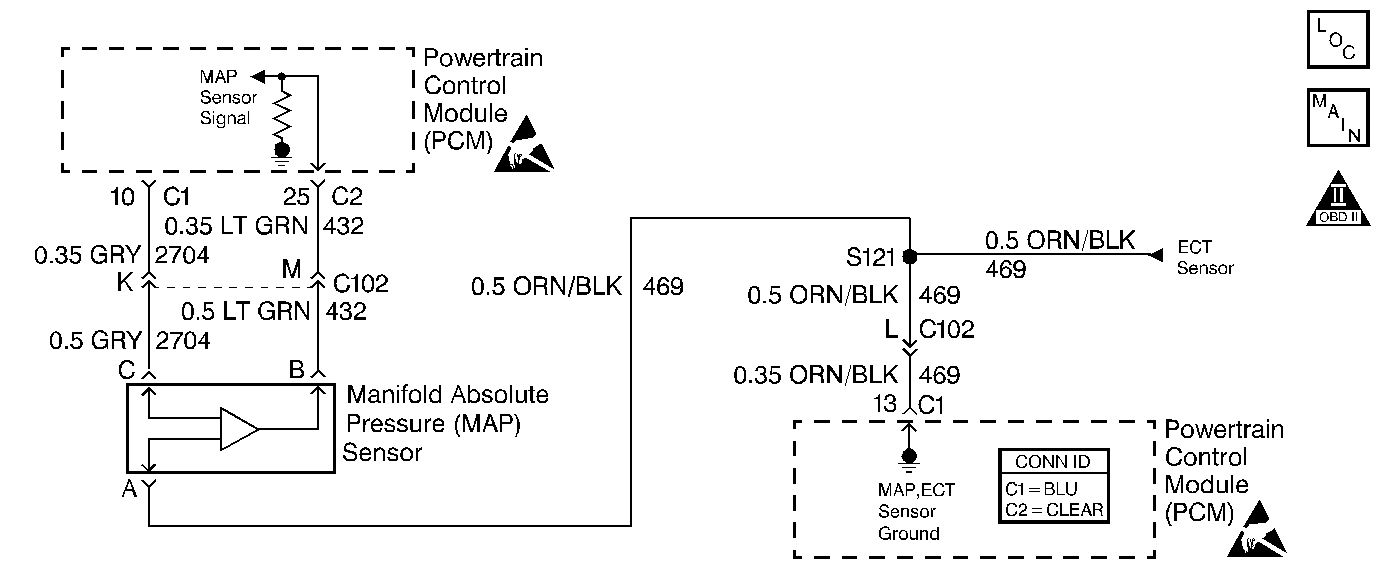
Circuit Description
The Manifold Absolute Pressure (MAP) sensor responds to changes in intake manifold pressure (vacuum). The MAP sensor signal voltage to the PCM varies from below 2 volts at idle (high vacuum) to above 4 volts with the key ON, engine not running or at wide open throttle (low vacuum).
The MAP sensor is used to determine manifold pressure changes while the EGR flow test diagnostic is being run, to determine engine vacuum level for some other diagnostics and to determine barometric pressure (BARO). The PCM monitors the MAP signals for voltages outside the normal range of the MAP sensor. If the PCM detects a MAP signal voltage that is excessively low, DTC P0107 will be set.
Conditions for Running the DTC
| • | No TP sensor DTCs present. |
| • | Engine running. |
| • | Throttle angle above 0%, if engine speed is below 1000 RPM. |
| • | Throttle angle above 10%, if engine speed is above 1000 RPM. |
Conditions for Setting the DTC
The MAP sensor signal is less than 12.1 kPa.
Action Taken When the DTC Sets
| • | The PCM will illuminate the malfunction indicator lamp (MIL) during the second consecuitive trip in which the diagnostic has been run and failed. |
| • | If equipped with traction control, the PCM will command the EBTCM via the serial data circuit to turn OFF traction control, and the EBTCM will illuminate the TRACTION OFF lamp. |
| • | The PCM will store conditions which were present when the DTC set as Freeze Frame and Failure Records data. |
Conditions for Clearing the MIL/DTC
| • | The PCM will turn OFF the MIL during the third consecutive trip in which the diagnostic has been run and passed. |
| • | The History DTC will clear after 40 consecutive warm-up cycles have occurred without a malfunction. |
| • | The DTC can be cleared by using the scan tool. |
Diagnostic Aids
Check for the following conditions:
| • | Monitor the MAP sensor using the scan tool. If the MAP sensor does not respond to throttle changes, check the 3X circuits from the ignition control module to the PCM. |
| If the 3X signal is lost the PCM will only update the MAP sensor reading once per key cycle, when the engine is first started. |
| Depending on where the MAP sensor voltage (high voltage or low voltage) is when the engine is started, the high or low voltage MAP sensor DTCs will set. |
| • | Poor connection at PCM. Inspect harness connectors for backed out terminals, improper mating, broken locks, improperly formed or damaged terminals, and poor terminal to wire connection. |
| • | Damaged harness. Inspect the wiring harness for damage. If the harness appears to be OK, observe the MAP display on the scan tool while moving connectors and wiring harnesses related to the sensor. A change in the display will indicate the location of the fault. |
If DTC P0107 cannot be duplicated, the information included in the Fail Records data can be useful in determining since the DTC was last set. If it is determined that the DTC occurs intermittently, performing the DTC P1107 Diagnostic Chart may isolate the cause of the fault.
Step | Action | Value(s) | Yes | No |
|---|---|---|---|---|
1 | Was the Powertrain OBD System Check performed? | -- | ||
2 |
Is the MAP value near the specified value? | 0.0 volt | ||
3 |
Does scan tool indicate DTC P0107 failed? | -- | Go to Diagnostic Aids | |
4 |
Is the MAP value near the specified value? | 4.95V | ||
5 |
Is MAP value near the specified value? | 4.95V | ||
6 |
Was the 5 volt reference A circuit open or shorted to ground? | -- | ||
7 | Check the 5 volt reference A circuit for a poor connection at the PCM and replace terminal if necessary. Refer to Wiring Repairs . Did the terminal require replacement? | -- | ||
8 |
Was the MAP signal circuit open or shorted to ground? | -- | ||
9 | Check the MAP sensor signal circuit for a poor connection at the PCM and replace terminal if necessary. Refer to Testing for Continuity , Intermittents and Poor Connections Diagnosis , Repairing Connector Terminals and Connector Repairs . Did the terminal require replacement? | -- | ||
10 | Replace the MAP sensor. Is the action complete? | -- | -- | |
11 | Replace the PCM. Important: : Replacement PCM must be programmed. Refer to Powertrain Control Module Replacement/Programming . Is the action complete? | -- | -- | |
12 |
Does scan tool indicate DTC P0107 failed? | -- | System OK |
